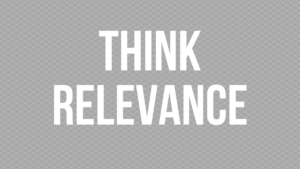 Resumes are tough for most people. We have difficulty figuring out what information to put on, what to leave off, and which advice to listen to. I do resume reviews regularly – for ClearedJobs.Net and others – and in my consulting work read tons of resumes and help hiring managers make sense of what they should look for.
Resumes are tough for most people. We have difficulty figuring out what information to put on, what to leave off, and which advice to listen to. I do resume reviews regularly – for ClearedJobs.Net and others – and in my consulting work read tons of resumes and help hiring managers make sense of what they should look for.
Companies have cursed themselves with processes which lead to far too many resumes to consider; partly this is a result of efforts to achieve EEO and diversity goals and meet federal requirements. Additionally, various websites scrape job postings from everywhere into one large source. Recruiters are commonly overwhelmed by the numbers of resumes received, although most do not meet the requirements of the job.
This discussion is on resumes for private sector cleared jobs, not federal or state jobs where the process is significantly different.
A resume is an advertisement for you. Like most ads, it should be created to meet the needs of the target audience. No car ad tries to appeal to everyone, neither should you. So your first step in job search is to actually figure out specific roles which you want. Second is to identify target employers which have such jobs and whose values and culture meet your needs. Then you can write a useful resume. But will you?
Resume Basics Regularly Done Poorly
1. Education
There is a standard format for education. Degrees are shown with the highest one first and any others which are related to your work goals shown in reverse order. Once you have any college degree, you omit your high school diploma. Once you have a BA/BS, omit your Associates degree(s) unless the AA is more recent and a part of your move to change careers.
The most common format on a resume is:
BS, Intelligence Studies, James Madison University, 2017
If you are finishing a degree and are within a year of completion, you use it too. Demonstrate your progress by showing as:
BS, Intelligence Studies, James Madison University, expected May 2019
Many people begin omitting the year once they are more than a decade past the degree.
If you are a recent graduate or have less than 4-5 years work experience:
- Include any relevant internships, research papers, competitions, or similar evidence of your added effort. Show these under the degree, not separately.
- List ‘cum laude’ or a high GPA there for the same reasons. Omit the various times you made the Dean’s List.
- Show how much of your education you paid for, in percentage, if you worked through college. Many hiring managers appreciate the added time management and ability to prioritize which that shows.
All this disappears from your resume once you are a few years out of school and have experience and achievements to demonstrate.
2. Training
Training can be a valuable addition to your resume. It must be directly related to the work you seek and it should be recent. Here you want to show the actual training program title and the training provider. The most common formula is:
- Cooley “HR Legal Issues Update”, 2018
- National War College (MA, Leadership & Management equivalent), 2016
Training can be shown with Education or separately. Do not include basics which employers simply expect, like MS Office, unless a job posting specifically asks.
Relevance and recency are also needed for certifications. Show the program and the certification and date. Omit those where you have not finished the program unless you are within a few months of doing so. If you do that, instead of the graduation date you say ‘Expected 12/18′
No one cares that you had training on Windows 98 or anything not needed by your desired job, or if you held a certification that expired some time ago. Omit these unless you work in legacy technologies for employers who want these skills.
Training and certifications which are very recent are especially useful when you are returning to the workplace after a period away or making a career change. Get them and show them up front.
3. Summary and Skills Lists
A summary is just that. It highlights the most important work achievements you have for the specific job. Far too many are all buzzwords and do nothing to grab an employer’s attention. Most recruiters and hiring managers will see this in a small preview pane – yours must make them want to read the rest of your resume. Otherwise it’s useless.
Skills lists have exploded. Few are useful. You do not want to hear what hiring managers say about them now.
- In the case of soft skills – show these in your achievements instead. No one will believe your bullet about great leadership or teamwork if it’s not clearly shown in your achievements.
- If you have specific skills which are critical to the work – especially true in technical jobs – those may be useful to list where they are not evident from the work shown. Again, they must be current and relevant.
4. Memberships and Other Professional/Volunteer Activities
If you are active in a professional organization, show that on your resume. However, listing every organization you currently or ever belonged to does nothing to help you get the job. Volunteer organizations, where you do work that shows skills you need but do not have from work, are also useful if relevant and recent. Examples:
- Program Development Chair, Montgomery County SHRM chapter, 2016-2018
- Fundraiser and Financial Manager, Community Lodgings, 2015-present
When you are unemployed, these activities are especially important. They show you are maintaining your professional development and can show new skills you have gained. If you have not been active in local chapters of professional organizations or participated in CTFs or volunteered at a conference – now is the time! As above, you can show these by type of work you did, the organization and the dates.
- Development team – Mobile App for Safety, Second Place, Smart City Hackathon, Washington DC, 2017
- Team Lead, Volunteers – trained and supervised 40 support staff, Run for Life, May 2018
How Many Resumes Do I Need
Everyone should have a master resume. This covers every job you have had with all your significant achievements plus the details of when, where, for whom. This should be updated regularly – after you change jobs, at a promotion, and annually. That is when you still remember your most important achievements. This resume serves as the basis for figuring out what jobs you might want next, for creating new resumes, and for completing applications.
Next you should have a networking resume. This is usually a one-pager with a headline under your name and contact info showing the type work you seek. An example: Federal Business Development Executive It shows highlights from your recent work. A recent award or a quote on your work from a senior executive or customer is often useful.
Third, and similar to a networking resume is one you will use for ClearedJobs.Net Job Fairs and to upload to ClearedJobs.Net. This is one-two pages and will be your first audition for a range of employers. Here, the resume can be somewhat more general than one tailored for a specific employer. Still, it must show direct expertise, achievements, and education for the role you seek. A headline, as above, is often useful for these resumes too – if you use one, it should use a common job title or type you seek. An example: Intelligence Analyst / Team Leader
No resume, whether for networking, job boards, or job fairs, should be so general that readers will not immediately know what specific roles you seek. If you are transitioning military or a retiring fed, you may want to have two such resumes if you have two different career paths you are pursuing. But not more than two, or you look unfocused.
Fourth, the employer specific resume is what you want when you are applying to a specific employer. For this resume, you will replace any career field general language with the keywords the employer uses. You will be sure you have chosen the best of your past achievements as they relate to the specific company and role. You will edit as needed to reflect their role, the company values, and anything important you have learned about the target in your research.
In all these most useful resumes, you need a simple Word document with limited formatting for electronic use. Additionally you may want a visually attractive one for in-person use. This means one-inch margins, double spacing between sections, a common font such as Tahoma or Arial, and 10-12 point size type.
Start your resume with your name and contact information and LinkedIn profile URL. When applying for jobs which require a security clearance or attending a ClearedJobs.Net job fair, add your security clearance here in its simplest format: TS/SCI.
There is a recent trend for names done in large size, elaborate fonts on resumes. This hurts you. It cuts the amount of space you have for the achievements which will interest your targets. It makes some hiring managers wonder about whether you are narcissistic.
Generally, unless you have at least 10 years of experience, a one-page resume shows your skills while also demonstrating your ability to focus on what is important. Once you get more experience, two pages which demonstrate both your increasing achievements and progression are fine. You only need to cover the most recent 10-12 years unless the job posting specifically asks for more experience.
In general, resumes are organized so that your current job shows the most achievements, with each previous job you show having fewer achievements. If you have recently started your current job or are focused on new jobs which require skills shown in past jobs, you may want to minimize the current job details to those most related to your desired next step and give more space to the one held just before it.
Need more information and ideas for your resume? We have a number of blog posts – just search ‘resume’ in the search blog space over to the right. Head over to the ClearedJobs.Net YouTube channel for videos on resumes and many other subjects.
 Patra Frame is ClearedJobs.Net’s HR Management Consultant. She is an experienced human resources executive and founder of Strategies for Human Resources. Patra is an Air Force veteran and charter member of the Women in Military Service for America Memorial. Follow Patra on Twitter @2Patra.
Patra Frame is ClearedJobs.Net’s HR Management Consultant. She is an experienced human resources executive and founder of Strategies for Human Resources. Patra is an Air Force veteran and charter member of the Women in Military Service for America Memorial. Follow Patra on Twitter @2Patra.

Excellent tips for job seekers at all career levels.
Excellent recommendations.